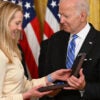“We’ve got to figure some way out of this.”
That’s Senate Majority Leader Mitch McConnell, referring to congressional deadlock over key provisions of the Patriot Act that are about to expire.
The question, amid concerns over government data-gathering and the dramatic uptick in terrorist attacks, is what that way should be.
Like it or not, the United States is at war with al-Qaida, the Taliban, the Islamic State and associated forces. It must therefore rely on all lawful tools of national security, including robust “signals” intelligence.
As the 9/11 Commission Report made clear, a major failure before the 9/11 attacks was the government’s inability to “connect the dots” on known or suspected terrorists.
Any debate about America’s counterterrorism capabilities must be conducted in the context of the actual terrorist threat the U.S. faces. Terrorist organizations have undertaken a significant effort to recruit and radicalize individuals worldwide. FBI Director James Comey recently testified that the Islamic State is contacting “hundreds, maybe thousands” of individuals across the U.S. to attack the U.S. homeland.
Secretary of Homeland Security Jeh Johnson has echoed these warnings, saying that lone-wolf terrorists inspired by the Islamic State could strike at any moment.
The U.S. has improved its ability to foil these attacks, largely due to intelligence capabilities that include the bulk telephone metadata program under Section 215 of the Patriot Act.
For decades our country has relied on robust signals intelligence to gather critical information about our enemies. For the most part, the communications we were most interested in happened overseas and were gathered without a warrant.
In 1978, Congress passed the Foreign Intelligence Surveillance Act, which established the Foreign Intelligence Surveillance Court to review government requests for orders allowing for electronic surveillance. FISA allowed the FBI to obtain orders from the FISC authorizing common carriers to provide the government certain business records for the purpose of foreign intelligence and international terrorism investigations.
After 9/11, Congress passed the Patriot Act. Under Section 215 of the Patriot Act, the government—pursuant to FISC court order—has been collecting telephone metadata information in bulk. Phone companies provide routing information, including date and time of call, number called, and duration of call. The content of calls isn’t collected.
As Americans, we cherish our constitutional rights, including our right to privacy. Numerous court decisions have held that that data, in the hands of third-party providers, are not protected by the Fourth Amendment. To date, two federal district courts have issued opinions regarding bulk telephone metadata collection: One held that the practice didn’t violate the Fourth Amendment, the other, written by Judge Richard Leon, found that it did.
Two other federal district courts issued opinions that appear to conflict with Judge Leon’s decision. The government appealed Judge Leon’s decision, and that appeal is pending before the Court of Appeals for the District of Columbia Circuit.
In view of the Islamic State and al-Qaida’s renewed determination to strike the American homeland, it would be unwise to completely abandon the use of telephone metadata to help disrupt terrorist plots and/or gain intelligence about foreign terrorists. There are three major policy options that Congress should consider:
- Amend Section 215 to allow the National Security Agency to continue to collect bulk telephone metadata and query that data as permitted by court order; codify the existing program, but add in cellphone data as well; and fold in the transparency, privacy and civil liberties contained within the USA Freedom Act.
- Require that a private, third-party entity house the bulk telephone metadata, including cellphone data. Court orders from the FISC would authorize select employees of the private entity, with appropriate security clearances, to query the database. As with option one, Congress could add transparency, civil liberties, and privacy protections contained in the USA Freedom Act.
- Reauthorize Section 215 and reform it to end government bulk collection of telephone metadata by the NSA. Instead, the metadata resides with the telephone carriers, where the government will have access to it subject to a court order by the FISC.
The House of Representatives has, in effect, selected option three by passing the USA Freedom Act. It certainly could be improved, but it contains other meaningful reforms and civil liberty protections.
It’s time for Congress to make a choice.



























